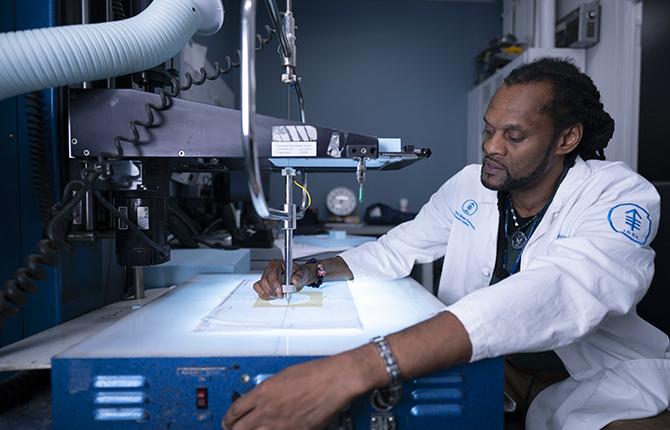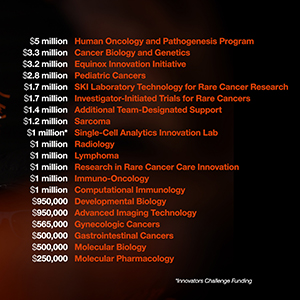
2023 Allocations
The Cycle for Survival community raised $30 million for rare cancer research during the 2023 season — and 100% of every dollar has now been awarded to doctors and scientists at MSK.
2023 Research Programs
Every dollar raised through Cycle for Survival goes directly to rare cancer research at MSK, where leading experts in cancer research and clinical care collaborate to produce lifesaving breakthroughs that benefit people worldwide.
Each year, all funds are allocated just six months after the close of fundraising — an exceptionally rapid timeline that accelerates progress in leading-edge research, drug development, and technological innovation.
The priorities highlighted here were selected in close partnership with MSK’s leadership because of their great potential to advance the new, more effective treatments for rare cancers. These include several areas of translational research, which brings lab-based findings to patients in real time, as well as discovery science, which informs a foundational understanding of rare cancers down to the individual cell.
Thank you to our community for fueling progress. Together, we will beat rare cancers.
Human Oncology and Pathogenesis Program
$5 million
The Human Oncology and Pathogenesis Program (HOPP) is MSK’s hallmark translational research program. Uniting brilliant MSK physicians and scientists who have one foot in the laboratory and the other in the clinic, HOPP is an accelerator for bringing innovative cancer-fighting strategies to people with rare cancers who need them. The program is led by Charles Sawyers, MD, and focuses on creating novel therapies, especially for people who have few or no effective treatment options. This funding will allow investigators to pursue research that could lead to new treatments and cures.
Dr. Sawyers is Chair of HOPP and Marie-Josée Kravis and Henry R. Kravis Chair in Human Oncology and Pathogenesis.
Cancer Biology and Genetics Program
$3.3 million
The Cancer Biology and Genetics (CBG) Program in the Sloan Kettering Institute (SKI) gathers experts across multiple disciplines to improve cancer prevention, diagnosis, and treatment. Cycle for Survival is proud to award funding to Scott Lowe, PhD, Robert Benezra, PhD, and Luis Parada, PhD, whose research teams are studying the biology and genetics of tumor formation and growth, and discovering new therapies. Cycle for Survival funds are fueling the testing and development of technologies to help researchers better understand the genetic changes underlying various cancers, including pancreatic and other rare cancers. These resources will allow CBG researchers to continue to identify vulnerabilities within cancers and design tailored therapies. The CBG staff works closely with MSK clinical colleagues to rapidly translate their findings to help patients.
Dr. Lowe is Chair of the CBG Program, Chair of the Geoffrey Beene Cancer Research Center, and Geoffrey Beene Senior Chair. Dr. Benezra is Deputy Director for Core Technologies at SKI and Laura and Christopher Pucillo Chair in Metastasis Research. Dr. Parada is Director of the Brain Tumor Center and Albert C. Foster Chair.
Equinox Innovation Initiative
$3.2 million
The Equinox Innovation Initiative, named in honor of Cycle for Survival’s founding partner, fuels game-changing rare cancer research that embodies the spirit of Equinox. These coveted annual grants are awarded to MSK physicians and scientists through a highly competitive process and enable them to pursue leading-edge research with speed and agility.
Congratulations to the 2023 grantees: Alison Moskowitz, MD, a Linn family grantee; Luc Morris, MD, MSc; Nai-Kong Cheung, MD, PhD; Daniel Heller, PhD; Gopa Iyer, MD; Hikmat Al-Ahmadie, MD; Hans-Guido Wendel, MD; and Eugene Pietzak, MD.
Pediatric Cancers
$2.8 million
All pediatric cancers are rare cancers, and Cycle for Survival is proud to support MSK Kids, which sees more children and young adults with cancer than any other pediatric program in the country. Led by Andrew Kung, MD, PhD, MSK Kids is home to a dedicated team of clinicians and scientists who are improving care for children and young adults, and are developing more effective, less toxic treatments for them. Pediatric cancers receive far less research funding than adult diseases, but Cycle for Survival is helping fill the gap. The Tow Center for Developmental Oncology is a translational research hub that unites investigators from across MSK to make breakthrough discoveries about pediatric cancers, and are using these insights to design new therapies specifically for young patients. Cycle for Survival funding is fueling lifesaving research collaborations and clinical trials of innovative new therapies within MSK Kids.
Dr. Kung is Chair of the Department of Pediatrics and Lila Acheson Wallace Chair for Pediatric Research.
SKI Laboratory Technology for Rare Cancer Research
$1.7 million
Each year, research teams from the Sloan Kettering Institute (SKI) are invited to apply for funds to purchase laboratory equipment that will enhance their capacity to make scientific discoveries that could lead to new therapeutic breakthroughs for people with a rare cancer. Following a committee review, technologies that have the greatest potential to significantly boost research capabilities are approved for funding. This year, funds from Cycle for Survival will allow for the acquisition of six new state-of-the-art technologies to support the work of researchers across the institution. From advanced imaging analysis to drug testing, these technologies will ensure that MSK remains at the forefront of rare cancer research and care for many years to come.
Investigator-Initiated Trials for Rare Cancers
$1.7 million
Scientists studying rare cancers often generate promising research leads but lack the resources and pharmaceutical industry support to test their findings in clinical trials. Cycle for Survival is making it possible for MSK investigators to initiate and run their own clinical trials for rare cancers. Paul Sabbatini, MD, leads a committee that has selected 15 studies to receive support this year from a fund established by Cycle for Survival. Testing a range of approaches, including immunotherapy and precision oncology treatments, these trials are bringing attention and resources to historically underfunded cancers and reaching groups of people who are underrepresented in cancer research, including children.
Dr. Sabbatini is Deputy Physician-in-Chief for Clinical Research.
Sarcoma
$1.2 million
MSK’s Sarcoma Medical Oncology Service is one of the world’s largest and most productive programs devoted to treating and finding new therapies for sarcoma, a group of more than 80 subtypes of cancer that originates in the bones or soft tissues and often affects adolescents and young adults. At the helm of the service is William Tap, MD, who, in collaboration with colleagues, oversees dozens of clinical trials, testing novel approaches to treating sarcoma and refining methods for determining which patients are best suited to a particular therapy.
Dr. Tap is Chief of the Sarcoma Medical Oncology Service.
The 2023 Innovators Challenge: The Single Cell Analytics Innovation Lab
$1 million
The Single Cell Analytics Innovation Laboratory (SAIL) at MSK develops and implements advanced single-cell molecular-profiling technologies and data analytics that support discovery and translational research in more than 80 labs across MSK. Studying each cell within a tumor individually helps researchers understand cancer on a much deeper level. These analyses can reveal rare genetic alterations that may influence how a particular cancer is treated and can answer questions about how cancer evolves and spreads. Funds from the 2023 Innovators Challenge will allow SAIL, under the leadership of Dana Pe’er, PhD, and Ronan Chaligné, PhD, to accelerate the development of new single-cell analytic tools and implement existing methods to advance rare cancer research across MSK.
Dr. Pe’er is Chair of the Computational and Systems Biology Program in the Sloan Kettering Institute, Scientific Director of the Alan and Sandra Gerry Metastasis and Tumor Ecosystems Center, and Alan and Sandra Gerry Endowed Chair. Dr. Chaligné is an Assistant Lab Member in the Pe’er lab and Director of SAIL.
Radiology
$1 million
MSK is a pioneer in oncology-focused radiology research, which drives innovations that advance rare cancer diagnosis and care. Lawrence Schwartz, MD, leads the Department of Radiology at MSK, where doctors and scientists are creating image-processing methods based in artificial intelligence (AI) that can help teams determine the most effective treatment for each patient, including people with rare cancers. Cycle for Survival is excited to support Dr. Schwartz and his team as they launch studies of new imaging analytics tools designed to discover whether AI methods can improve sarcoma and leukemia care by identifying enlarged lymph nodes or affected organs through CT images.
Dr. Schwartz is Chair of the Department of Radiology.
Lymphoma
$1 million
MSK has long been a trailblazer in developing and testing new treatments for blood cancers, including lymphoma. Pioneering investigations by Kojo Elenitoba-Johnson, MD, and Megan Lim, MD, PhD, aim to better understand these rare cancers and uncover how the genomic changes associated with lymphoma initiate cancer and lead to its progression. Their findings are informing the validation of biomarkers for cancer detection and will influence care for children and adults with lymphoma and other rare cancers.
Dr. Elenitoba-Johnson is Chair of the Department of Pathology and Laboratory Medicine, James Ewing Alumni Chair of Pathology, and a Member of Human Oncology and Pathogenesis Program. Dr. Lim is an Attending Pathologist in the Hematopathology Service.
Research in Rare Cancer Care Innovation
$1 million
Thanks to advances in cancer care — including many made at MSK with support from Cycle for Survival — more people with a rare cancer survive for longer periods of time. Because of this progress, there is a great need for research into the complex issues facing people who are in ongoing treatment. Corita Grudzen, MD, MSHS, is leading MSK’s efforts to reimagine cancer care and meet the evolving needs of people with rare cancers and their families. Cycle for Survival is providing critical support for this work, which will transform care at MSK and hospitals worldwide.
Dr. Grudzen is Head of the Division of Supportive and Acute Care Services and Fern Grayer Chair in Oncology Care and Patient Experience.
Immuno-Oncology
$1 million
MSK doctors and scientists have made historic discoveries about the role of the immune system in controlling cancer. As part of immuno-oncology research on rare cancers, doctors closely monitor immune cells and other markers in blood and tumor samples taken from patients during immunotherapy or other cancer treatments. Cycle for Survival funding is helping our immune-monitoring team, under the guidance of Michael Glickman, MD, expand its capabilities in this important area. This includes increasing computational capacity to ensure that our investigators can conduct the complex analyses needed to understand the relationship between the immune system and cancer, and facilitating partnerships between clinicians and scientists so that they can glean the greatest insights from patient samples.
Dr. Glickman is Alfred P. Sloan Chair and a Member of the Immunology Program in the Sloan Kettering Institute.
Computational and Translational Immunology
$1 million
Immunotherapy has transformed the treatment of some cancers, including leukemia and multiple myeloma, as well as many other rare cancers. But not everyone responds safely to treatment, partly because these therapies target proteins that are present in only some cancers. With support from Cycle for Survival, Caleb Lareau, PhD, and his team are using advanced data science and artificial intelligence tools to mine massive genomic data sets, including the MSK-IMPACT® database and single-cell studies, to uncover new targets for immunotherapies. Their work aims to make immune-based therapies safer and more effective while expanding the application of these promising treatments to more people with cancer.
Dr. Lareau is an Assistant Member of the Computational and Systems Biology Program in the Sloan Kettering Institute.
Developmental Biology
$950,000
Researchers in the Developmental Biology Program in the Sloan Kettering Institute study how cells form healthy tissues and organs, organize and repair damage, and form tumors. Cycle for Survival is making it possible for Anna-Katerina Hadjantonakis, PhD, Alexandra Joyner, PhD, and their colleagues to use microscopic imaging to study tissues with greater clarity and accuracy than ever before. Technologies including high-resolution advanced microscopy allow the team to visualize and track the behavior and development of individual cells. Their findings will expand what scientists know about the origins of rare cancers and inform new strategies to halt the progression of disease.
Dr. Hadjantonakis is Chair of the Developmental Biology Program and Alfred P. Sloan Chair. Dr. Joyner is a Member of the Developmental Biology Program and Courtney Steel Chair in Pediatric Cancer Research.
Advanced Imaging Technology
$950,000
State-of-the-art technologies are essential to conducting leading-edge rare cancer research. To advance research by Sloan Kettering Institute scientists, Cycle for Survival funds will be used to acquire a Yokogawa CellVoyager CV8000 High-Content Screening System, a gold-standard technology that provides fast, high-resolution imaging and analysis of cellular samples and 3D cellular models called organoids. The CV8000 will replace machines that have been in use for over 10 years and empower rare cancer research across MSK for the next decade.
Gynecologic Cancers
$565,000
MSK unites experts in gynecologic surgery, medical oncology, radiation oncology, pathology, basic and translational sciences, and nursing to provide comprehensive, compassionate care for people with gynecologic cancers, including tumors so rare that clinicians at other hospitals may never see them. Colleagues in laboratory science are conducting pioneering research to better understand how these cancers develop and why they stop responding to treatment, and clinical investigators are assessing innovative therapies in clinical trials. Cycle for Survival funding will advance progress toward their shared goal: to help people with gynecologic cancers live longer, better lives.
Gastrointestinal Cancers
$500,000
As global leaders in oncology, MSK doctors and scientists are experts in caring for people with gastrointestinal (GI) cancers, which include a range of rare cancers that originate in various parts of the GI tract. Cycle for Survival is proud to fund researchers who are developing new and better treatments for cancers of the appendix, esophagus, liver, and pancreas, as well as GI neuroendocrine tumors.
Molecular Biology
$500,000
DNA damage is one of the main causes of cancer, and scientists in the Molecular Biology Program in the Sloan Kettering Institute (SKI) are seeking to understand how an organism’s ability to repair damage to its own DNA correlates with the development or progression of cancer. Under the leadership of John Petrini, PhD, SKI scientists are investigating DNA-repair pathways to shed light on cancer at the molecular level and discover new treatments that can target the processes that allow cells to sense DNA damage and respond to it.
Dr. Petrini is Chair of the Molecular Biology Program, Director of the Functional Genomics Initiative, and Paul A. Marks Chair in Molecular Cell Biology.
Molecular Pharmacology
$250,000
Discovering rare cancer drugs is an exploratory process. The Molecular Pharmacology Program in the Sloan Kettering Institute (SKI) unites investigators from different fields to study how drugs interact with cancer cells and to fast-track diagnostics and therapies for people with cancer. Cycle for Survival is proud to support these researchers, including David Scheinberg, MD, PhD, a physician-scientist who specializes in the development of immunotherapies aimed at new targets in cancer cells.
Dr. Scheinberg is Chair of the Experimental Therapeutics Center, Deputy Director for Therapeutic Discovery at SKI, and Vincent Astor Chair.

Additional Team-Designated Support
$1.4 million
Cycle for Survival is proud to support a wide range of rare cancer research initiatives that have the potential to transform bold ideas into lifesaving breakthroughs. Each project that Cycle for Survival funds empowers progress toward new and more effective ways to diagnose, treat, and cure people with a rare cancer.
Share Your Impact
Use the images below to let your friends and family know about the rare cancer research supported by 2023 Cycle for Survival funding. Share a post on social media or send your donors an email to thank them for their support!

